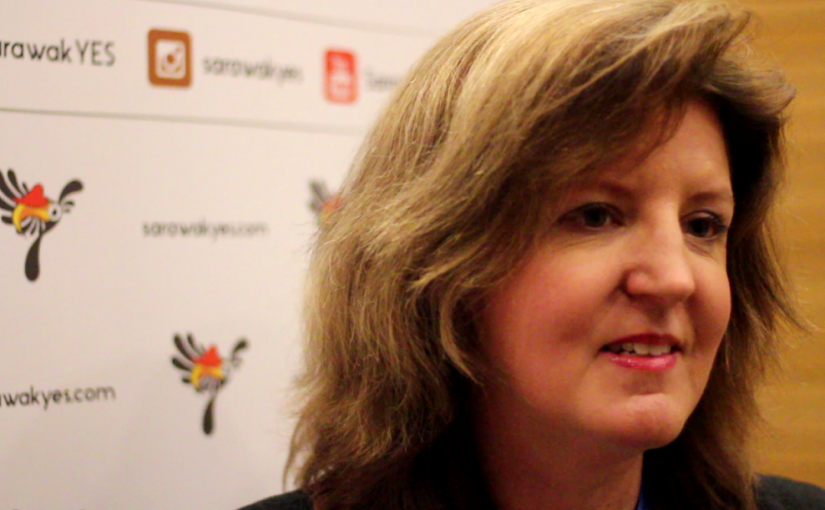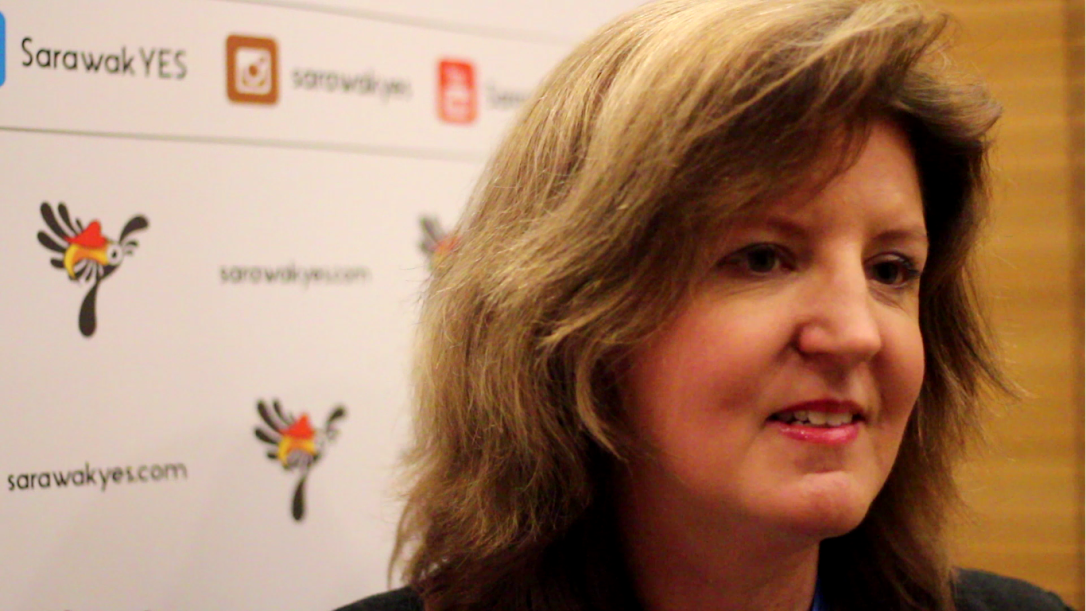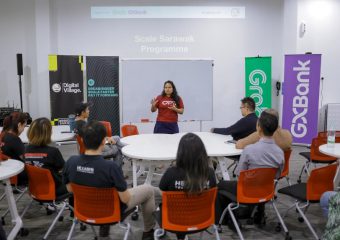Wendy Perry, the Australian-based Head Workforce Planner at Workforce BluePrint was among the international experts attending last week’s World TVET Conference 2015 in Kuching.
She sat down with SarawakYES! and offered some great advice on TVET, apprenticeships and becoming an entrepreneur. Below is a transcript of our interview.
Q: What are the questions that young people should ask before considering TVET for their education?
A: So there are a number of questions that young people need to ask themselves before they consider what TVET option is what they want to have a look at. And I think a key thing is that they need to think about what’s the vision for the career that they want to have. Don’t start with what’s the job role that I could do. What’s something that will get you out of bed in the morning so you get to go to work, not that you’ve got to go to work? And what does that look like, how are you spending your days, what are you even wearing, are you inside, are you outside, are you meeting people, are you working by yourself? If you have a clear vision for the sort of career that you want, then you can look at, based upon that vision, all of these different options that might in fact suit. So it could be that you want to work outside and perhaps with your hands, so something in building and construction might work for you. Or maybe you want to do something where you’re caring for other people, so child care or aged care, or nursing, or working with people with disabilities might be the way to go. If you start with a vision, then you can open up all sorts of opportunities rather than thinking, first of all I’m going to do a course. And I think it’s important to see if you can try different things out, see what the job roles are in fact like before you make a decision about committing to a long-term study program.
Q: Can you share how has Australia successfully raised awareness about TVET as an option?
A: In Australia we have a very strong TVET system. And at the heart of that is Australian apprenticeships. We have a very long history of people working, particularly in the trade areas, to learn the skills from somebody else. And we have a number of actions or strategies that help people see TVET as a viable option. So when you’re in high school you have got lots of options to try different TVET programs out and to look at what might suit you and that’s called TVET in Schools. And that counts towards your graduating certificate as well, so it’s not something extra or on top of what you’re doing.
We often have young people who have casual or part-time jobs when they’re in high school, so they can see, you know, what might this industry be like or what might this job role involve. And we have implemented school-based apprenticeships, where young people come and work in a business – in fact in my business we have two school-based apprentices at the moment, and they come one day a week and they learn about business and often they’re working on social media and digital tasks and marketing, things that they naturally love. So we have a lot of career support and advice and a lot of opportunities for young people to try things out before they buy if you like, try them out before they commit to a three-year program or a four-year program.
Q: What are some of the questions that parents should ask about enrolling their children in TVET, or giving them that option instead of going for a degree?
A: If you’re a parent and you’re helping your son or daughter try and figure out what pathway they might want to take, if it’s TVET or if there’s another pathway. I think it’s important to make sure that you also understand what is the vision for the career that they want to have, what is the blueprint, what are the things that they want to be doing, and help educate yourself. What are the different programs that they might be able to do, is there something short that they can try out, or perhaps there are a number of different, smaller type programs that they can do before they make their mind up to commit to something long term.
And I think if you can encourage them also to think about apprenticeships and doing study whilst they’re in school to see what’s available, that’s an excellent way to go. And the other thing that I’d have to say, because I’m a mum of a 19-year-old young entrepreneur, is to think about maybe they could in fact be their own boss, maybe they could be a job maker, maybe they’re somebody that could in fact employ their friends even. And so there are lots of opportunities to try out this business entrepreneurship idea, there’s a big international startup movement and there’s lots of business relationships and connections. And I think as a parent, it’s important to try and work out, or help your young person work out, where should they go. But you’ve got to do some research yourself as well to help then advise them on what their options are.
Q: In your really interesting talk, you discussed connections between TVET and entrepreneurship. In your travels and work all over the world, does that only apply to developed countries or does it apply to places like Sarawak?
A: If you’re asking whether or not entrepreneurship is something that developed and developing countries need to have a look at, particularly for their young people where there might be issues about youth unemployment, or there might be things that they could get involved in that are not good for them or are not positive for them, I think that it applies equally across the whole world, actually. More people need to think about being their own boss and consider self-employment as an option for them.
I think, in particular in developed countries, it’s a huge opportunity for people to not just see that they have to wait for a job, or perhaps there’s difficulty trying to travel to where the work is, they can be in their hometown and they can create and employ themselves. And I think that this is something that worldwide is a bit of a movement that’s happening at the moment, and TVET can help particularly with the very practical business skills that you need to be successful.
Q: You talked about the importance of relationships between employers and the government. Can you touch on how maybe Sarawak can move forward with that in mind?
A: Often we get asked, what can government do to work with businesses and industry and how should the relationship work. And I think it’s really important that governments and people that are making policy – you know you have two ears and you have one mouth and you need to focus on listening rather than talking about government policy and government programs. You need to ask questions and you need to understand much more deeply about the problems that businesses and companies are in fact facing. If you can do that, then that engagement will be easy, it will be smooth, you’ll develop a very trusting, positive relationship. And if you can help take that information and turn it into quick, practical solutions to start off with, over time you’ll build that up into something much more significant. So it might turn into an industry-wide workforce plan, or a regional plan, and by doing that you will be demonstrating the right approach to engagement and you’ll have government policy that is spot on and what’s needed for businesses.




